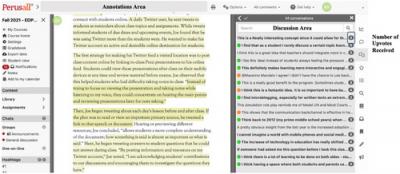I'm always pretty sceptical of the practitioner notes 'what is already known about this topic' segment. For example, here we read that "No study has explored the influential factors in peer upvoting within social annotation-based learning." A quick look at Google Scholar says otherwise. And anyways, how could this be true when the previous 'what is already known' states, "receiving upvotes from peers is not only a type of feedback but also a form of motivation, social interaction and social validation." How could we know this if there were no studies? We also read, "This study was the first to examine social annotations through the lens of the community of inquiry framework." But again, Google Scholar provides the counterexamples. Instead of journals forcing these stilted and often wrong 'practitioner notes' they should just let the authors write their papers and allow them to be taken at face value. The real question being studied here is "Are there any differences in cognitive and social presence between students receiving a high and low number of upvotes?" We don't need to artificially frame it. It's interesting enough on its own. 14 page PDF.
Today: 0 Total: 423 [] [Share]




